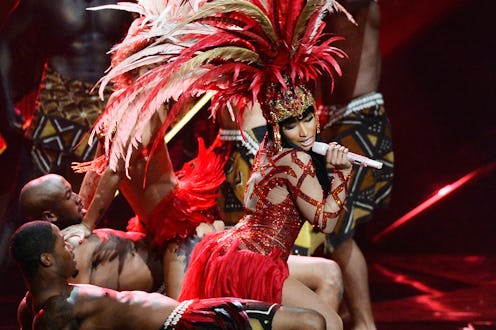Being influential means you're a leader who dares to pave your own way instead of waiting for someone else to do it. Being an icon means you're a symbol of something bigger and that your influence has led to great change that others find inspiration in. The distinction between the two is a small one, but it's also an important one especially when it comes to talking about Nicki Minaj, who made this year's Time's 100 Most Influential People list as the latter. Minaj's icon status in Time's opinion shows that she's someone to take seriously. That whether you like her music or not, she's broken down unbelievable barriers for women in hip-hop — all while being distinctly herself.
Minaj joins 12 others who earned a spot on the list in the icon category. Some you likely know: Adele, Leonardo DiCaprio, MMA champion Ronda Rousey, model Karlie Kloss and Olympian Usain Bolt. And perhaps a few others who you're just getting to know: tennis player Sania Mirza, the first Indian women to win a Women’s Tennis Association event; Tu Youyou, the first woman in China to win a Nobel Prize; gynecological surgeon Dr. Denis Mukwege, who is helping women in the eastern side of the Democratic Republic of Congo. Minaj, who is one of six people who earned a cover for this issue, earned her spot on the list for breaking the glass ceiling of hip-hop, for taking on a genre that has not been kind to women as a whole. Her ability to overcome long-held societal prejudices through hard work and perseverance makes her someone to admire.
In her label mate and mentor Lil Wayne's essay about Minaj he talks about the first time he saw her rap, which was on a DVD being sold on a New York Street. "She was just being Nicki without the glitz and glamour," Wayne said. "When I heard the first two and four bars, it wasn’t even about her rapping better than any female rapper. It was about, man, she’s rapping better than other rappers — period."
It's easy to look at Minaj and get caught up in the non-essential details of her career that seem to make headlines: Her Twitter misunderstanding with Taylor Swift, her feud with Iggy Azalea, her "what's good?" spat with Miley Cyrus. But, these stories don't define Minaj or what she means to music. Over the course of her three studio albums — her latest being 2014's The Pinkprint — Minaj has addressed racism and sexism in her lyrics, speaking out for women who don't always have a voice in hip-hop. In the process, she's become the most-charted female rapper in the history of the Billboard Hot 100. She places such an intense focus on education that many fans credit Minaj as the reason that they stay in school no matter how hard it gets or what the cost.
Minaj has also addressed those topics in interviews, letting everyone know she will not apologize or be made to feel less because someone doesn't like her music or the way she looks. She's shown women, specifically black women, that you can be powerful all on your own. That others don't define your beauty. That women of all body types are beautiful and should be treated with respect. That you can not only break into the boy's club, but you can obliterate it by being a strong, powerful, confident woman.
"She’s an icon, a boss and a role model to all these young girls out here on how to do it the right way," Wayne wrote for Time. "Her work ethic speaks volumes and has yielded these results." But, as Wayne says, she's not done and because of that he makes big predictions for her future: "Nicki Minaj will go down as one of the best to do it in the history of music."
One of the best? We imagine Minaj is towards being the best, period, and it's why we can only expect more icon-worthy accolades in her future.
Image: Giphy (2)
